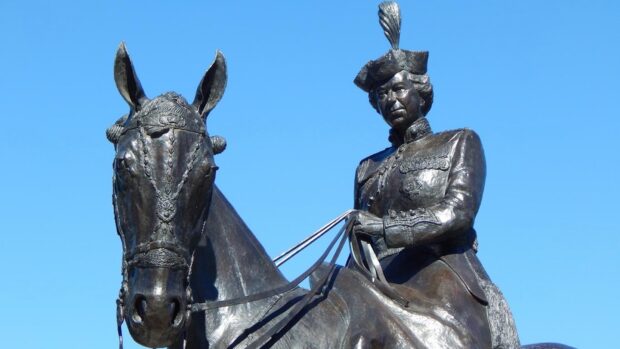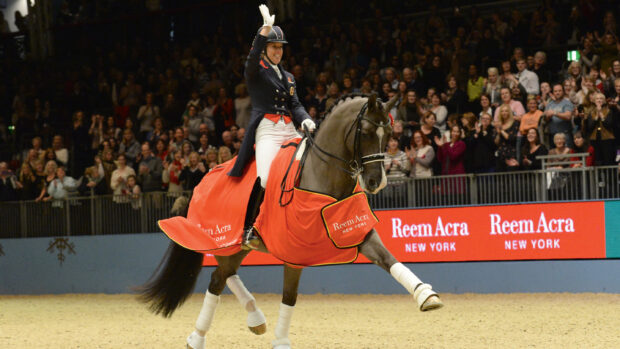A grand prix dressage rider who seemed “cavalier and arrogant” in ignoring professional advice as he caused suffering to young horses has been imprisoned and banned from keeping all animals for life. H&H reported last month that Sam Duckworth, of Newmarket Road, Cambridgeshire, was found guilty of charges relating to five young horses, at Kidderminster Magistrates’ Court, after an 11-day trial.
The 42-year-old was today (6 December) sentenced at the same court, for causing unnecessary suffering to five young horses in his care by failing to investigate and address the cause of their poor body condition and weight loss, and for failing to take steps to meet the needs of the same five horses, having failed to provide an adequate parasite control plan, required farriery and a suitable diet, and failing to seek veterinary attention in respect of the animals’ poor condition.
The court heard the charges applied from December 2020 to January 2021, when the horses were seized by the RSPCA. District judge Ian Strongman said the horses had to be moved to the premises concerned “in a bit of a rush”. The provider of the premises, Melvin Sanders, was then “put upon” by Duckworth to care for the horses.
“[Mr Sanders] did so because he felt for the animals and didn’t want to see them without,” Mr Strongman said. “Then Lauren Ball was brought on board.”
The court heard Ms Ball was highly experienced but only employed for an hour each day, “but she did an awful lot of extra work because she was concerned for the horses’ welfare, and ignored instructions from Mr Duckworth about feeding them,” Mr Strongman said. “She felt they needed more feed, and but for her, the animals could have been in a worse condition.”
Prosecutor Sara Pratt said that of the five horses, one was owned by Duckworth, the others in his care. One has since died in RSPCA care, having become unwell.
She said Mr Sanders was put in a position where he felt he had to care for the horses.
“The prosecutions says Mr Duckworth ignored warnings and professional advice given to him,” she said. “He was dismissive of the RSPCA and the advice he was given by RSPCA vets and his own. We find he failed properly to follow advice on feed and worming.”
Ms Pratt said Duckworth also ignored warnings from Ms Ball and Mr Sanders in relation to the horses’ welfare, referring to messages considered during the trial.
She also referred to evidence that the horses were suffering from malnourishment or a high worm burden, “or simply not having the nutrition they needed so they were metabolising their resources in terms of muscle and tissue to stay alive”.
The court heard the horses’ body condition scores were one at 0.5 on the 0-5 scale, three at one and one at 1.5, and Ms Pratt said the prosecution wanted him banned from keeping all animals, not just equids.
“He displayed what might be called a cavalier attitude to these horses in his care and failed to follow advice given by professionals,” she said. “He wasn’t someone who was incapable of recognising the needs of horses and wasn’t unable to care for them.
“He’s a professional rider and the behaviour he appears to have displayed appears bordering on arrogance, of knowing better than anyone, so we feel this likely to extend to other animals in his care. He’s simply unable to see his own failings or follow advice.
“According to him, he had the financial means to look after the horses but simply chose not to.”
Defence counsel Mr Jessop said this case was serious but not as serious as many that come before court.
He said the neglect of the horses was not prolonged; there was plenty of evidence between October 2020, when the horses were first seen, and January, when they were seized, that both Ms Ball and vets said there was “ample hay, bedding and feed”.
“For Lauren Ball, it might not have come quickly enough sometimes but she said to this court it always came and she always had a response from [Duckworth],” he said. “I took her through the messages and suggested he wasn’t shutting his ears to her pleas for assistance, feed or hay, and she agreed he’d reply sooner or later; it was never going to be quick enough for her. Her evidence supports this, that feed, bedding and hay were supplied and the horses’ needs were being dealt with. It’s not a case of total non-action or ignorance of what’s gone on.”
Mr Jessop said Duckworth “didn’t attend much” but that this was during Covid, which limited his ability to be on the premises.
“The evidence seems to suggest it wasn’t creeping suffering; it was more complex than that,” he said. “They were improving for a time. Lauren Ball said at Christmas only one seemed to drop and the others were improving. It appears deterioration may have happened after that, when many of the messages end. There’s no evidence of a high level of suffering.”
Mr Jessop said there was no evidence Duckworth did not worm, and that “he may not have done enough but it’s not the case he didn’t engage at all with vets or those looking after the horses”. He added that Duckworth did follow advice on feeding, and that he has worked with horses since he was 16 and had responsibility for “probably thousands of horses”.
“There was one incident in Germany that was completely unrelated; until now in terms of animal welfare, he’s a man of good character,” he said.
Mr Jessop said Duckworth’s only income was less than £1,000 per month from his parents, but Mr Strongman rejected this, and would not allow Duckworth to explain, adding: “I understand he said at any time, he had about 100 horses and breeding 60-80 foals a year, which he presumably sells. I find him an unreliable witness and I don’t think anything he could say would change my mind.”
There was dispute over the ownership of the horses but Mr Strongman said that as he had not seen sufficient evidence to suggest otherwise, he ruled that all belonged to Duckworth so a deprivation order was made on them.
Sam Duckworth was given an immediate 18-week prison sentence and ordered to pay £68,860 in costs, including the care of the horses since the seizure. He was banned from keeping all animals for life and cannot apply to reverse this for five years.
“It’s one of those cases where appropriate punishment can only be achieved with an immediate custodial sentence,” Mr Strongman said.
You might also be interested in:

Grand prix dressage rider found guilty of causing horses suffering

RSPCA ‘commended’ after grand prix rider convicted on equine welfare charges

Subscribe to Horse & Hound magazine today – and enjoy unlimited website access all year round
Horse & Hound magazine, out every Thursday, is packed with all the latest news and reports, as well as interviews, specials, nostalgia, vet and training advice. Find how you can enjoy the magazine delivered to your door every week, plus options to upgrade your subscription to access our online service that brings you breaking news and reports as well as other benefits.




